新编英汉翻译教程7 Amplification
- 格式:ppt
- 大小:228.00 KB
- 文档页数:23
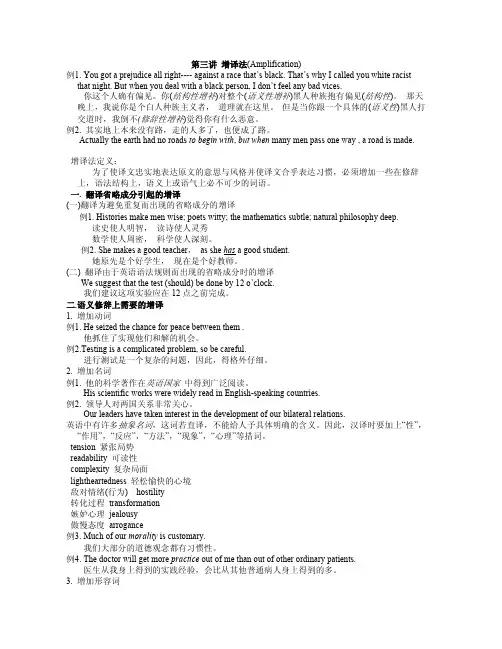
第三讲增译法(Amplification)例1.You got a prejudice all right----against a race that’s black.That’s why I called you white racist that night.But when you deal with a black person,I don’t feel any bad vices.你这个人确有偏见。
你(结构性增补)对整个(语义性增补)黑人种族抱有偏见(结构性)。
那天晚上,我说你是个白人种族主义者,道理就在这里。
但是当你跟一个具体的(语义性)黑人打交道时,我倒不(修辞性增补)觉得你有什么恶意。
例2.其实地上本来没有路,走的人多了,也便成了路。
Actually the earth had no roads to begin with,but when many men pass one way,a road is made.增译法定义:为了使译文忠实地表达原文的意思与风格并使译文合乎表达习惯,必须增加一些在修辞上,语法结构上,语义上或语气上必不可少的词语。
一.翻译省略成分引起的增译(一)翻译为避免重复而出现的省略成分的增译例1.Histories make men wise;poets witty;the mathematics subtle;natural philosophy deep.读史使人明智,读诗使人灵秀数学使人周密,科学使人深刻。
例2.She makes a good teacher,as she has a good student.她原先是个好学生,现在是个好教师。
(二)翻译由于英语语法规则而出现的省略成分时的增译We suggest that the test(should)be done by12o’clock.我们建议这项实验应在12点之前完成。
二.语义修辞上需要的增译1.增加动词例1.He seized the chance for peace between them.他抓住了实现他们和解的机会。
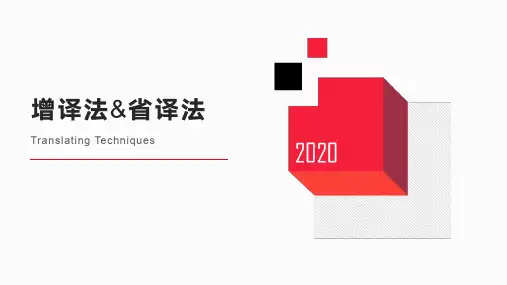
Translating Techniques增译法&省译法u增词法就是在翻译时根据意义上或修辞上或句法上的需要增加原文中虽无其词但有其义的一些词。
u增词绝不是无中生有,不是随意增加原文没有的意义。
u Some metals are easy to machine; others are not.一些金属容易加工,而另一些却。
south.u你也许感到好奇,为什么磁铁的极指向南北呢?u增译的原则:不可添意,适可而止u You may wonder why the magnet's poles point north an1.Reading makes a full man; conference a ready man; and writingan exact man.2.We don’t regret, we never have and never will.3.After the basketball, he still has an important conference.1. Reading makes a full man; conference a ready man; and writing an exact man.读书充实,讨论机智,笔记(写作)使人准确。
2. We don’t regret, we never have and never will.我们不会后悔,我们从来没有,我们将来也不会。
3. After the basketball, he still has an important conference.看完篮球比赛之后,他还有一个重要会议。
1.With what enthusiasm the Chinese people are building socialism!2.The crowds melted away.3.As he sat down and began talking, words poured out.4.She lingered long over his letter.With what enthusiasm the Chinese people are building socialism! 中国人民正以热情建设社会主义啊!The crowds melted away.人群散开了。
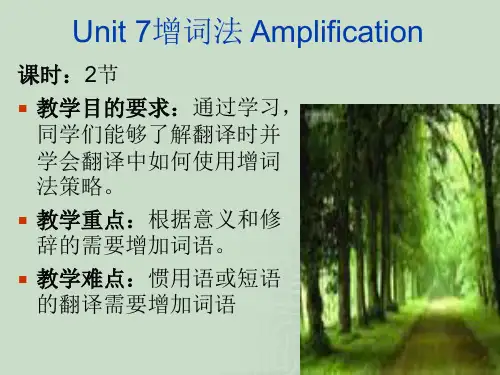
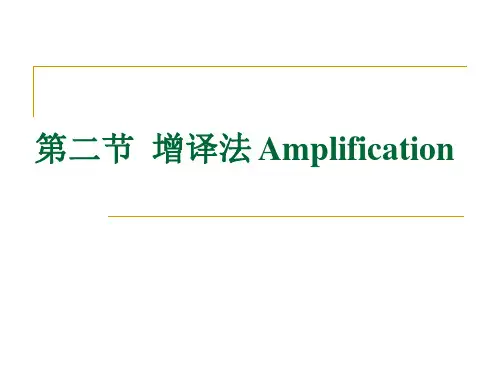
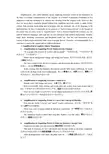
Amplification , also called addition, means supplying necessary words in our translation on the basis of accurate comprehension of the original. As a matter of principle, a translator is not supposed to add any meaning to or subtract any meaning from the original work. However, this does not mean that a translator should refrain from supplying necessary words to make his/her version both accurate in meaning and in keeping with the idiomatic use of the language to be translated into. In fact, it is precisely for the purpose of “faithful representation” of the thought of the author that we often resort to “amplification”. This is because English and Chinese are two entirely different languages and each has its own historical and cultural background. Besides, many ideas, idiomatic expressions and shorthand words, etc. That are well understood in the country of their origin can hardly make sense to people abroad. Therefore, it is unimaginable for a translator to stick to the orginal pattern without alteration.Ⅰ. Amplification in English-Chinese Translation1.Amplification by Supplying Words Omitted in the Original"if so grand, why so poor? If so poor, why so grand?" “既然那么阔,干吗要叫穷?既然那么穷,干吗摆阔气?”·Matter can be changed into energy, and energy into matter. 物质可以转化为能,能也可以转化为物质。
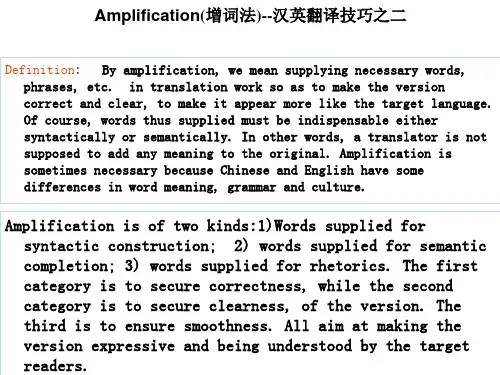
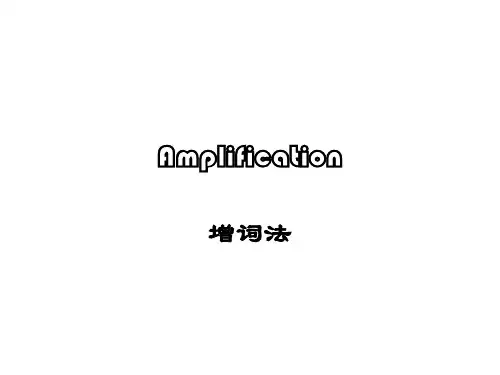
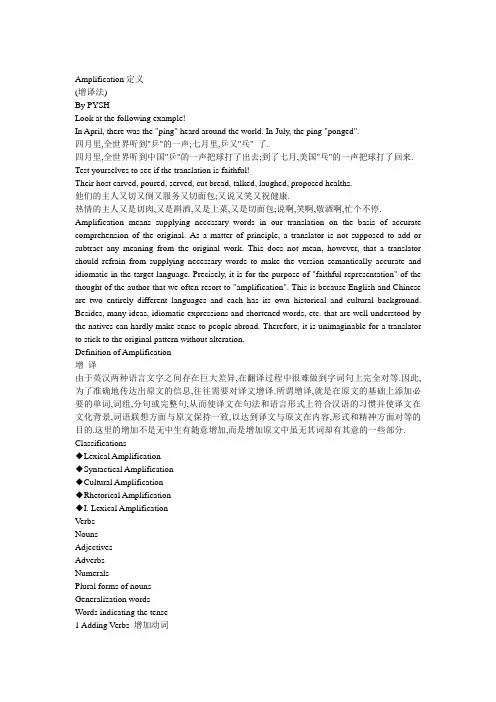
Amplification定义(增译法)By PYSHLook at the following example!In April, there was the "ping" heard around the world. In July, the ping "ponged".四月里,全世界听到"乒"的一声;七月里,乒又"乓" 了.四月里,全世界听到中国"乒"的一声把球打了出去;到了七月,美国"乓"的一声把球打了回来. Test yourselves to see if the translation is faithful!Their host carved, poured, served, cut bread, talked, laughed, proposed healths.他们的主人又切又倒又服务又切面包;又说又笑又祝健康.热情的主人又是切肉,又是斟酒,又是上菜,又是切面包;说啊,笑啊,敬酒啊,忙个不停. Amplification means supplying necessary words in our translation on the basis of accurate comprehension of the original. As a matter of principle, a translator is not supposed to add or subtract any meaning from the original work. This does not mean, however, that a translator should refrain from supplying necessary words to make the version semantically accurate and idiomatic in the target language. Precisely, it is for the purpose of "faithful representation" of the thought of the author that we often resort to "amplification". This is because English and Chinese are two entirely different languages and each has its own historical and cultural background. Besides, many ideas, idiomatic expressions and shortened words, etc. that are well understood by the natives can hardly make sense to people abroad. Therefore, it is unimaginable for a translator to stick to the original pattern without alteration.Definition of Amplification增译由于英汉两种语言文字之间存在巨大差异,在翻译过程中很难做到字词句上完全对等.因此,为了准确地传达出原文的信息,往往需要对译文增译.所谓增译,就是在原文的基础上添加必要的单词,词组,分句或完整句,从而使译文在句法和语言形式上符合汉语的习惯并使译文在文化背景,词语联想方面与原文保持一致,以达到译文与原文在内容,形式和精神方面对等的目的.这里的增加不是无中生有随意增加,而是增加原文中虽无其词却有其意的一些部分. Classifications◆Lexical Amplification◆Syntactical Amplification◆Cultural Amplification◆Rhetorical Amplification◆I. Lexical AmplificationVerbsNounsAdjectivesAdverbsNumeralsPlural forms of nounsGeneralization wordsWords indicating the tense1 Adding Verbs 增加动词Tom Canty, born in rags and dirt and misery, what sight is this! (Mark Twain: The Prince and the Pauper)汤姆·康第,生在破烂,肮脏和苦难中,现在这番景象却是多么显赫啊!汤姆·康第原来生在可怜巴巴的人家,穿得破破烂烂,邋里邋遢,现在换了这身装束,啊,是何等的气派!She felt the flowers were in her fingers, on her lips, growing in her breast.她觉得手里和唇上都是花, 胸中也是花.她觉得她好像手里拿着花, 嘴里吻着花,就连胸中也开出了花来.She played the piano, the violin and in her lateryears, the recorder.她弹钢琴,拉小提琴,晚年时还吹直笛.2 Adding Nouns 增加名词Adding nouns after abstract nouns在抽象名词后面增加名词Adding nouns after concrete nouns 在具体名词后面增加名词Adding nouns before adjectives 在形容词前面增加名词Adding nouns after intransitive verbs 在不及物动词后面增加名词A. Adding nouns after abstract nouns在抽象名词后面增加名词evaporationfault-findinggracefulnessnecessitymodernizationindifferencetransformationsegregationlight-heartedness蒸发作用吹毛求疵的作法优雅气质必要性现代化冷漠态度转化过程隔离政策/隔离措施轻松愉快的心境B. Adding nouns after concrete nouns在具体名词后面增加名词a) 当具体名词表达某种抽象概念时, 在译文中常常需要根据上下文增加一些适当的名词. The molecules of hydrogen get closer and closer with the pressure.b) 在具体名词后面增加名词,避免译文含混,使译文符合汉语习惯.Many great writers were not appreciated fully while they were alive.D. Adding nouns after intransitive verbs在不及物动词后面增加名词When he learned it was to borrow, not to give, that the messenger had come, his tone changed.当他知道使者是来借钱而不是来送礼后,说话的口气马上就变了.The horse is in the grassland eating.马正在草原上吃草.英语中的某些不及物动词虽然没有宾语,但宾语实际上是隐含在动词后面的.6. Adding Certain Wordswith the Concept of Plurality增加表达复数的词汉语中的名词没有复数概念,也没有词形上的变化,很多情况下不必表达出来;而英语中的名词有词形的变化,但没有量词,所以在翻译成汉语的时候,可根据情况增加重叠词,数词或其他一些词来表达复数的概念,以达到修辞效果.A.Amplification by Repetition增加重叠词表示复数All roads lead to Rome.条条大道通罗马.Flowers bloom all over the yard.朵朵鲜花开满了整个庭院.7. Adding Words of Generalization增加概括词概括词是英汉两种语言所共有的,但有时英语句子中并没有出现概括词,而翻译的时候却往往可以加入"两人","双方","等","等等","凡此种种"等概括词,同时省略掉英语中的连接词.Like most wildlife,tigers reproduce,grow,and store fat in the summer and fall when there is plenty of nutritious food available.与大多数野生动物一样,老虎在营养丰富,食物充足的夏秋两季,繁殖,生长储存脂肪.8. Adding Words for Different Tenses 增加表达时态的词英语时态是靠动词的词形变化或助词来体现的.汉语中的动词没有时态的变化,要表达时态就必须靠时态助词和一些表示时间的词.所以,在表达过去的概念时往往加上"曾","已经","过","了"等字眼,在表达进行时态时往往用"在","正在","着"等字眼,在表达将来时态时往往用"将","就","要","会","便"等字眼.此外,为了强调时间概念或强调时间上的对比,往往增加一些其他的词.强调时间上的对比She makes a good teacher, as she was a good student.她原先是个好学生,现在是个好老师.Man, was, is and always will be trying to improve his living conditions.It was said that his father was a fisherman. Maybe he was as poor as we are.◆II. Syntactical AmplificationAdding the omitted verbs增补原文中省略的动词Adding the omitted sentence elements增补原文比较句中的省略部分Adding the omitted answers增补原文回答句中的省略部分Adding the implied subject in participles增补分词形式中隐含的主语Adding the logical words and phrases增补表示逻辑关系的词语1. 增补原文中省略的动词这里所说的原文中省略的动词,指的是在并列关系的复句中在后句中省略的动词.在翻译成汉语的时候,出于句法上的需要,有时还需要将动词补出.另外,在某些英语句子当中由于一个谓语动词连接几个宾语或表语,在译文中往往要重复这个动词.5. 增补表示逻辑关系的词语有时候英语原文中并没有表达逻辑关系的词语,但根据上下文可以判断出其隐含的逻辑关系,如转折,假设,让步,因果关系等,在翻译成汉语的时候,要适当地在句中或句子之间补充关联词和承上启下的词.Summary增译和省译往往是译者在推敲译文或校对译文的过程中进行的,可见这类调整与译者的母语语感很有关系,从本质上说这是一个译文的可读性问题(readability),其关键在求得译文与原文在深层结构上的对应,而不求双语在词语形式上的机械对应.。
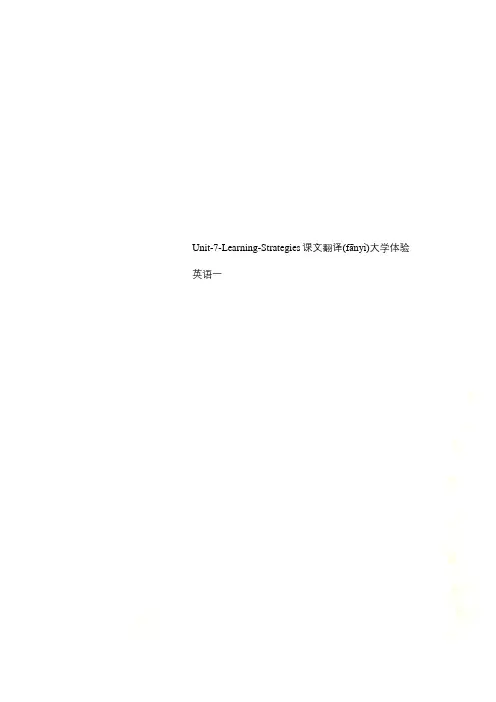
Unit-7-Learning-Strategies课文翻译(fānyì)大学体验英语一Unit-7-Learning-Strategies 课文翻译大学体验(tǐyàn)英语一Unit 7 Learning StrategiesPassage A Not Just a Job, an Adventure: Undergraduate ResearchSophia Stella, a sophomore at Columbia's School of Engineering, is one of many undergraduates who become involved, one way or another, in research performed at the university. Some do it for academic credit, some for money, some just for experience. Students and professors agree that an undergraduate research project can be uniquely beneficial to both parties.Ideally, undergraduate research is an opportunity for the kind of intensive study that can expand the mind in ways traditional courses can't. Economics Professor Ralph Edison says: "To really understand a discipline you have to get the feeling that knowledge isn't just out there and you passively have to absorb it, but rather that it's constantly beingcreated and we're constantly rethinking things... When students see a discipline as evolving rather than fixed, they usually get a lot more excited about learning because they see that it's an ongoing process." He points out that research can be exciting because "a research project really gives students an opportunity to answer real-life questions that we don't know the answers to."Research also spurs independent thinking and intellectual confidence in students. Amelia, a graduate student in computer science, says, "You had to go out and learn on your own. You weren't going to be spoon-fed." Her fond memories of work as an undergraduate researcher played an important role in her decision to leave her Wall Street programming job and return to Columbia as a graduate student.Arthur Hannah, a political science graduate of Columbia College says undergraduate research "felt like a whole new mode of learning." Instead of looking for the knowledge we do have, he says, research forces students to look for knowledge we don't have. It's a process of looking for holes and trying to plug them, which is completely different from the classroom experience of learning what others already know. He also describes how creating a piece of original research instilled a "pride of authorship" in his work, something he hadn't found in his regular classes.Most undergraduates doing research are working for credit. They register for a semester-long course and do a project for a professor who gives them a grade for their efforts. In some departments a research project might constitute an honors thesis.Some students do research for pay. Taken simply as a form of employment, it's one of the most desirable jobs available to undergraduates. Stella says, "I need some kind of income, and I'd rather work here than in the cafeteria"; paid research work gives her an opportunity to transform a work-study job into an engaging aspect of her education. The money for her wages is available because of a program started this year providing $100 000 to fund undergraduate research. This funding is intended to support about 50 undergraduates in work-study research positions.Other students do research not for credit or for money but simply on a volunteer basis. Usually, these are students pursuing a career that requires some demonstration of altruistic commitment, such as medicine.As Economics Professor Ralph Edison says: "Undergraduate research can become a valuable part of education. It's a real and valuable privilege. It hasto remain an extraordinary undertaking for extraordinary people in extraordinary circumstances."A篇大学生在校搞研究(yánjiū)哥伦比亚大学工程学院二年级学生(xuésheng)索菲亚·斯黛拉,是众多以各种方式在校参与研究工作(gōngzuò)的学生之一。
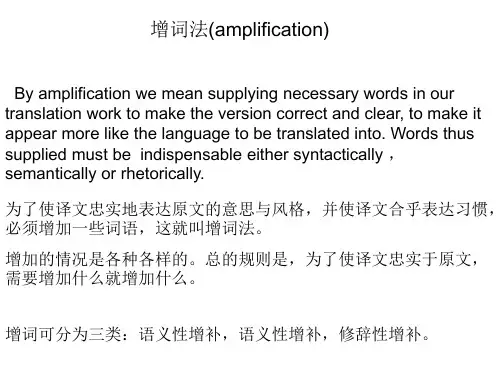
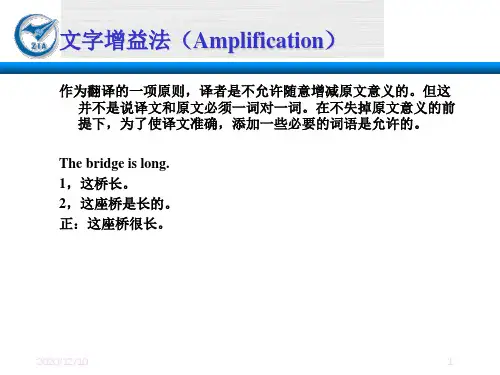
Unit 4 AmplificationAmplification, also called addition, means supplying necessary words in our translation on the basis of accurate comprehension of the original. As a matter of principle, a translator is not supposed to add any meaning or subtract any meaning from the original. However, this does not mean that a translator should refrain from supplying necessary words to make his/her version both accurate in meaning and in keeping with the idiomatic use of the language to be translated into. In fact, it is precisely for the purpose of “faithful representation” of the author that we often resort to “amplification”.I. Amplification in English-Chinese Translation. Adding Words Omitted in the Original•"If so grand, why so poor If so poor, why so grand"“既然那么阔,干吗要叫穷既然那么穷,干吗摆阔气”•Matter can be changed into energy, and energy into matter.物质可以转化为能,能也可以转化为物质。
Amplif icati on定义(增译法)By PYSHLook at the follow ing exampl e!In April, therewas the "ping" heardaround the world. In July, the ping "ponged".四月里,全世界听到"乒"的一声;七月里,乒又"乓" 了.四月里,全世界听到中国"乒"的一声把球打了出去;到了七月,美国"乓"的一声把球打了回来. Test yourse lvesto see if the transl ation is faithf ul!Theirhost carved, poured, served, cut bread, talked, laughe d, propos ed health s.他们的主人又切又倒又服务又切面包;又说又笑又祝健康.热情的主人又是切肉,又是斟酒,又是上菜,又是切面包;说啊,笑啊,敬酒啊,忙个不停.Amplif icati on meanssupply ing necess ary wordsin our transl ation on the basisof accura te compre hensi on of the origin al. As a matter of princi ple, a transl atoris not suppos ed to add or subtra ct any meanin g from the origin al work. This does not mean, howeve r, that a transl atorshould refrai n from supply ing necess ary wordsto make the versio n semant icall y accura te and idioma tic in the target langua ge. Precis ely, it is for the purpos e of "faithf ul repres entat ion" of the though t of the author that we oftenresort to "amplif icati on". This is becaus e Englis h and Chines e are two entire ly differ ent langua ges and each has its own histor icaland cultur al backgr ound. Beside s, many ideas, idioma tic expres sions and shorte ned words, etc. that are well unders toodby the native s can hardly make senseto people abroad. Theref ore, it is unimag inabl e for a transl atorto stickto the origin al patter n withou t altera tion.Defini tionof Amplif icati on增译由于英汉两种语言文字之间存在巨大差异,在翻译过程中很难做到字词句上完全对等.因此,为了准确地传达出原文的信息,往往需要对译文增译.所谓增译,就是在原文的基础上添加必要的单词,词组,分句或完整句,从而使译文在句法和语言形式上符合汉语的习惯并使译文在文化背景,词语联想方面与原文保持一致,以达到译文与原文在内容,形式和精神方面对等的目的.这里的增加不是无中生有随意增加,而是增加原文中虽无其词却有其意的一些部分. Classi ficat ions◆Lexical Amplifi cati on◆Syntacti cal Amplifi cati on◆Cultural Amplifi cati on◆Rhetori calA mplifi cati on◆I. Lexical Amplifi cati onVerbsNounsAdject ivesAdverb sNumera lsPlural formsof nounsGenera lizat ion wordsWordsindica tingthe tense1 Adding V erbs增加动词Tom Canty, born in rags and dirt and misery, what sightis this! (Mark Twain: The Prince and the Pauper)汤姆·康第,生在破烂,肮脏和苦难中,现在这番景象却是多么显赫啊!汤姆·康第原来生在可怜巴巴的人家,穿得破破烂烂,邋里邋遢,现在换了这身装束,啊,是何等的气派!She felt the flower s were in her finger s, on her lips, growin g in her breast.她觉得手里和唇上都是花, 胸中也是花.她觉得她好像手里拿着花, 嘴里吻着花,就连胸中也开出了花来.She played the piano, the violin and in her lateryears, the record er.她弹钢琴,拉小提琴,晚年时还吹直笛.2 Adding Nouns增加名词Adding nounsafter abstra ct nouns在抽象名词后面增加名词Adding nounsafter concre te nouns在具体名词后面增加名词Adding nounsbefore adjecti ves在形容词前面增加名词Adding nounsafteri ntran sitiv e verbs在不及物动词后面增加名词A. Adding nounsafter abstra ct nouns在抽象名词后面增加名词evapor ationfault-findin ggracef ulnes snecess itymodern izati onindiff erenc etransf ormat ionsegreg ationlight-hearte dness蒸发作用吹毛求疵的作法优雅气质必要性现代化冷漠态度转化过程隔离政策/隔离措施轻松愉快的心境B. Adding nounsafter concre te nouns在具体名词后面增加名词a) 当具体名词表达某种抽象概念时, 在译文中常常需要根据上下文增加一些适当的名词. The molecu les of hydrog en get closer and closer with the pressu re.b) 在具体名词后面增加名词,避免译文含混,使译文符合汉语习惯.Many greatwriter s were not apprec iated fullywhilethey were alive.D. Adding nounsafterintran sitiv e verbs在不及物动词后面增加名词When he learne d it was to borrow, not to give, that the messen ger had come, his tone change d.当他知道使者是来借钱而不是来送礼后,说话的口气马上就变了.The horseis in the grassl and eating.马正在草原上吃草.英语中的某些不及物动词虽然没有宾语,但宾语实际上是隐含在动词后面的.6. Adding Certai n Wordswith the Concep t of Plural ity增加表达复数的词汉语中的名词没有复数概念,也没有词形上的变化,很多情况下不必表达出来;而英语中的名词有词形的变化,但没有量词,所以在翻译成汉语的时候,可根据情况增加重叠词,数词或其他一些词来表达复数的概念,以达到修辞效果.A.Amplif icati on by Repeti tion增加重叠词表示复数All roadslead to Rome.条条大道通罗马.Flower s bloomall over the yard.朵朵鲜花开满了整个庭院.7. Adding Wordsof Genera lizat ion增加概括词概括词是英汉两种语言所共有的,但有时英语句子中并没有出现概括词,而翻译的时候却往往可以加入"两人","双方","等","等等","凡此种种"等概括词,同时省略掉英语中的连接词.Like most wildli fe,tigers reprod uce,grow,and storefat in the summer and fall when thereis plenty of nutrit iousfood availa ble.与大多数野生动物一样,老虎在营养丰富,食物充足的夏秋两季,繁殖,生长储存脂肪.8. Adding Wordsfor Different Tenses增加表达时态的词英语时态是靠动词的词形变化或助词来体现的.汉语中的动词没有时态的变化,要表达时态就必须靠时态助词和一些表示时间的词.所以,在表达过去的概念时往往加上"曾","已经","过","了"等字眼,在表达进行时态时往往用"在","正在","着"等字眼,在表达将来时态时往往用"将","就","要","会","便"等字眼.此外,为了强调时间概念或强调时间上的对比,往往增加一些其他的词.强调时间上的对比She makesa good teache r, as she was a good studen t.她原先是个好学生,现在是个好老师.Man, was, is and always will be trying to improv e his living condit ions.It was said that his father was a fisher man. Maybehe was as poor as we are.◆II. Syntac tical Amplifi cati onAdding the omitte d verbs增补原文中省略的动词Adding the omitte d senten ce elemen ts增补原文比较句中的省略部分Adding the omitte d answer s增补原文回答句中的省略部分Adding the implie d subjec t in partic iples增补分词形式中隐含的主语Adding the logica l wordsand phrase s增补表示逻辑关系的词语1. 增补原文中省略的动词这里所说的原文中省略的动词,指的是在并列关系的复句中在后句中省略的动词.在翻译成汉语的时候,出于句法上的需要,有时还需要将动词补出.另外,在某些英语句子当中由于一个谓语动词连接几个宾语或表语,在译文中往往要重复这个动词.5. 增补表示逻辑关系的词语有时候英语原文中并没有表达逻辑关系的词语,但根据上下文可以判断出其隐含的逻辑关系,如转折,假设,让步,因果关系等,在翻译成汉语的时候,要适当地在句中或句子之间补充关联词和承上启下的词.Summar y增译和省译往往是译者在推敲译文或校对译文的过程中进行的,可见这类调整与译者的母语语感很有关系,从本质上说这是一个译文的可读性问题(readability),其关键在求得译文与原文在深层结构上的对应,而不求双语在词语形式上的机械对应.。
amplication翻译介绍Amplification增词法1. In terms of Meaning and Rhetoric(1) adding verbsIn the evening, after the banquets, the concerts and the show, he would work on the paper.晚上在参加宴会、出席音乐会、观看表演之后,他还得撰写论文。
There were no speeches, no foreign diplomats, no ordinary Chinese with paper flags and bouquets of flowers.没有发表讲话,没有各国外交官到场,也没有中国人挥舞纸旗鲜花的场面。
(2)adding adjs.With what enthusiasm the Chinese people are building socialism!中国人民正在以多么高涨的热情建设社会主义啊!O, Tom Canty, born in rags and dirt and misery, what sight is this!啊,汤姆.康第,生在破烂、肮脏和苦难中,现在这番景象却是多么煊赫啊!(3)adding advsAs he sit down and begin talking, words poured out.他一坐下来就讲开了,滔滔不绝讲个没完.In the films of those days, all too often it was the same one:boy tractor driver meets girl tractor driver; they fall in love and drive tractors together.在那个时候的电影里,总是老一套:男拖拉机手和女拖拉机手始而相遇,继而相爱,终而并肩开拖拉机了.(4)adding nounsa. after vi.First you borrow, then you beg.头一遭借钱,下一遭讨饭.Day after day, he came to his work---sweeping, scrubbing, cleaning.他每天来干活-扫地,擦地板,收拾房间.For you youth, just see, save and serve.年轻人应该见点世面,攒点积蓄,为国家出点力.b.after concrete nounsHe felt the patriot rise within his breast.他感到一种爱国热情在胸中激荡.He allowed the father to be overuled by the judge, and declared his son guilty.他让法官的职责战胜了父子的亲情,而判决他儿子有罪.c. before adj.This typewriter is indeed cheap and fine.这部打字机真是价廉物美He is a complicated man---moody and mercurial.他是个性格复杂的人-喜怒无常,反复多变.d. after abstract nounsPersuasion 说服工作Preparation 准备工作Backwardness 落后状态Tension 紧张局势Arrogance 自满情绪Madness 疯狂行为Antagonism 敌对态度(5)plurality增加复数词a.reduplicative wordsFlowers bloom all over the yard.朵朵鲜花开满了庭院Newsmen went flying off to Mexico.记者纷纷飞到墨西哥去了.There are rows of houses which he has never seen before.一排排的房子,都是他从未见过的b. numeralsThe lion is king of animals.狮子是百兽之王.The emperors in China shared the same character---skeptical.中国的历代皇帝都有一个共同的特点-生性多疑.(6) words to show tense.I had once needed so much your encouragement.当年,我曾是那么需要你的鼓励.Roger was, and remain, grateful for what she did for his family.对于她为他家的付出,罗杰过去很感激,现在仍然很感激.You were and are my best friend.你过去是现在仍然是我最好的朋友.I was a business man, and now a teacher.过去我是个生意人,而如今是名教师.过去我是做生意的,如今为人师表.(7)modal particle(语气助词)Don’t take it seriously! I’m just making fun of you.不要认真嘛!As for me, I didn’t agree from the very beginning.我呢,从一开始就不赞成.He described his homeland—its forests, its villages, its people--- which could arise only out of deep love for one’s native.他描绘家乡的风土人情-森林啦,村庄啦,父老乡亲啦-只有深深热爱家乡的人才能说得如此娓娓动听.(8) quantifier (量词)A bike , a mou th, a lady, a piano…A red sun rose slowly from the calm sea.A stream was winding its way through the valley into the river.Once , they had a quarrel.I want to have a rest because I am tired out.9.backgroundObama’s Asian trip is later proved fruitful.美国总统...What little boy brought to Japanese people is nothing but tears and blood.二战期间投下的第一颗原子弹...10 Transitional wordsYes, I like Chinese food. Lots of people do these days, sort of the fashion.不错,我喜欢中国菜.现在很多人喜欢中国菜,这算是有点赶时髦吧!For mistakes had been made, bad ones.因为已经犯了许多错误,而且还是严重的错误.11. 概括词general wordsIn short, and so on …总之,等等。